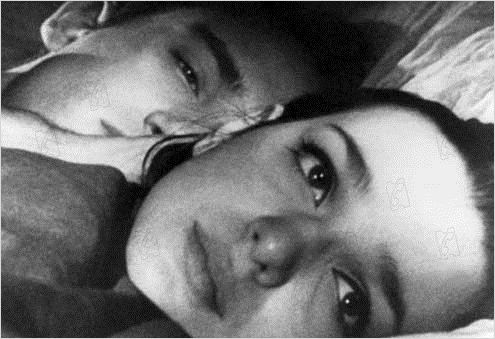When we were putting together Shadows, we said, 'Sure, we'll make a movie.' We had this loft, and they started to build sets and everything, and I went on a radio show, and I said, 'Wouldn't it be terrific if just people could make movies instead of all these Hollywood bigwigs who are only interested in business and how much the picture was going to gross and everything?' The next day, two thousand dollars in dollar bills came in. Not only that, Shirley Clarke, who was working in those days as one of the few independent filmmakers, had the only equipment in town, so she brought it down and said, 'Go ahead, take it, I'm not doing anything for six months. Take the equipment.' So we had the equipment, and one girl came in with a mustache and she really looked like an ogre. She was enormous, maybe four hundred fifty pounds. Stringy hair and a print dress. As soon as she saw me she said, 'I listened to your program last night,' and she got down on her knees, and I said, 'What are you doing? This is shocking; stop this.' She said, 'What can I do? I'll do anything.' I said, 'Don't do that, whatever you do.' I said, 'Grab a broom, sweep up this joint.' So over a period of three years we worked on this film, Shadows. And none of us knew what to do; I mean we didn't know anything about filmmaking at all. I had made movies, but I was only interested in myself. I didn't care where the camera was. All I heard was, 'Roll them, action, print that,' so I would say, 'Print that.' There was no one to write that down. So when we got through with this film, I had about five or seven thousand dollars in it. I said, 'That's enough...' It cost forty thousand by the time we were through. Tremendously hard work, but it was thoroughly enjoyable, and we made every mistake that you think is possible to make until the second picture. But, you know, 'Print it.' So when it was finished, we didn;'t have enough money to print the sound, and it was improvised; the whole picture was improvised, there was no dialogue, so every take was different. Se we looked at it and said, 'What the hell are we going to print here? I don't know what they're saying. It looks terrific, everything's in focus, the exposure's all right, it's beautiful - we'll lay in the lines.' Anyway, I thought, live sound is everything, we have to print that sound. So we had a couple of secretaries who used to come up all the time and do transcripts for us, but they volunteered their services. They had nothing to do; we had all silent film. So we went to the deaf-mute place and we got lip-readers. They read everything and it took us about a year. We had a wonderful time, though. We knew a liquor store down the street. We were drunk all the time, happy. It was a hapy experience. It took us three years to put the film together.
We had the worst sound track in the world on Shadows because we were in a dance studio, and people were above us, below us, the traffic and noise and I didn't know. 'How's the sound?' 'Great.' So I really think that we innovated in that sense, we innovated through an absolute accident. We spent maybe two months on the dubbing, two months trying to get the sound right. We couldn't get the noises out, so that's the way the film came out, and thereafter the commercials picked that up, and thereafter other filmmakers started to make films that way. For us, it was a terrible trial, but when we were in England, they said, 'What a great sound track; you could finally hear life, you could finally hear other things going on.


هیچ نظری موجود نیست:
ارسال یک نظر